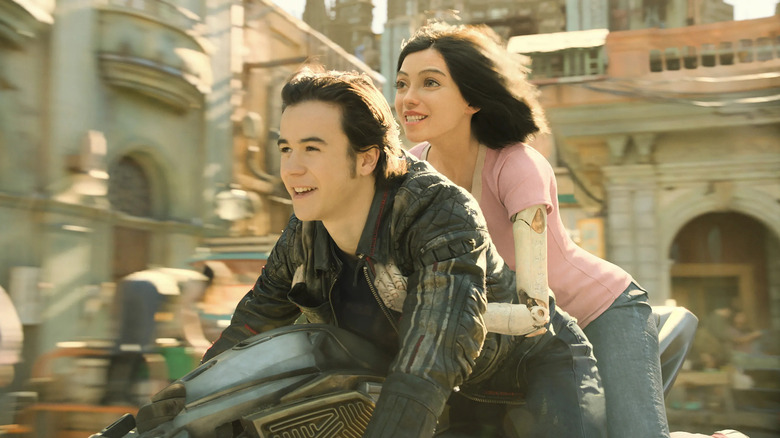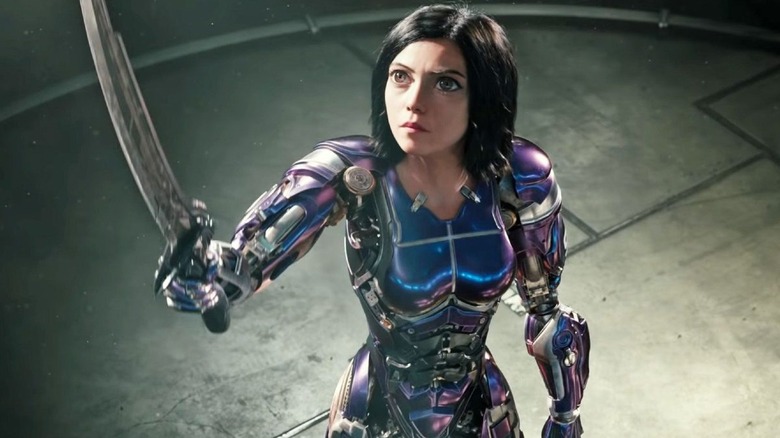
When James Cameron was first introduced to Yukito Kishiro's manga "Battle Angel Alita" in 1999, he fell so in love with the story that he began developing a movie adaptation barely a year later. Just read the manga and you'll see why Cameron was drawn to it. The story takes place in an apocalyptic future where humans incorporate technology into their bodies and become cyborgs — that's the story of "Terminator" too. The chance to realize such an out-there world in live-action must have also been a tempting challenge for a special effects wizard like Cameron. (It was so daunting in fact that Cameron decided to tackle "Avatar" first, as they believed that would help inform their approach to "Alita: Battle Angel.")
Cameron was also likely drawn to "Alita" for its emotional core. The titular female cyborg falls for a young thief named Hugo, who desires to go to the hovering city of Zalem. When he tries climbing to it, he's picked off by the defenses and falls to his death. Losing Hugo and having to carry on without him -- avenging him becomes Alita's driving goal -- is pretty similar to how the stories of both Sarah Connor & Kyle Reese from "Terminator" and Jack & Rose from "Titanic" end. Cameron is very fond of a doomed love story, but a concept reel from 2005 revealed that the 2019 film -- eventually directed by Robert Rodriguez ("Sin City") -- almost averted the manga's tragedy.
Flipping The Ending

The "Alita: Battle Angel" concept reel flips one of the most pivotal moments from the manga and two-chapter OVA on its head. In them, Hugo tries to climb a cable that links Zalem to the world below. Alita pleads her love for him and that he abandon his foolhardy quest. Just when she seems to get through, a rotating blade comes down and eviscerates Hugo. Alita catches what remains but Hugo's arm breaks off and he falls.
But in the concept reel -- narrated by Hugo -- the positions are reversed. Alita regains memories that she was meant to destroy Zalem and tries to climb to the city. Hugo is instead the one who admits his love and talks her out of going. The rest of the sequence plays out similarly, only this time Hugo doesn't fall after Alita catches him. Hugo's narration concludes: "And so it began, the legend of the Battle Angel. The girl who came down from the sky to destroy the world, but instead chose to save it. That's my baby."
However, the finished film reverts to a faithful adaptation of the manga. It ends with Alita (Rosa Salazar) pointing her sword toward Zalem, as she's observed by the city's leader Nova (Edward Norton). This cliffhanger ending leads much better in the hopeful trilogy, with the next chapters supposedly "Alita: Fallen Angel" and then "Alita: Avenging Angel."
The concept reel opts for an open end, yet it's strangely more definitive. Alita declares that "[it's] time to shake the pillars of Heaven," though she'd have a much better motive to do so if Hugo is dead. The film's ending might be inconclusive, but it packs a better punch than a happy one.
Read this next: 12 Awesome Action Movies That Never Got Sequels
The post Alita: Battle Angel Almost Featured A Much Happier Ending For Hugo appeared first on /Film.
/Film https://ift.tt/ekXyRWg February 25, 2023 at 10:00AM
Комментарии
Отправить комментарий